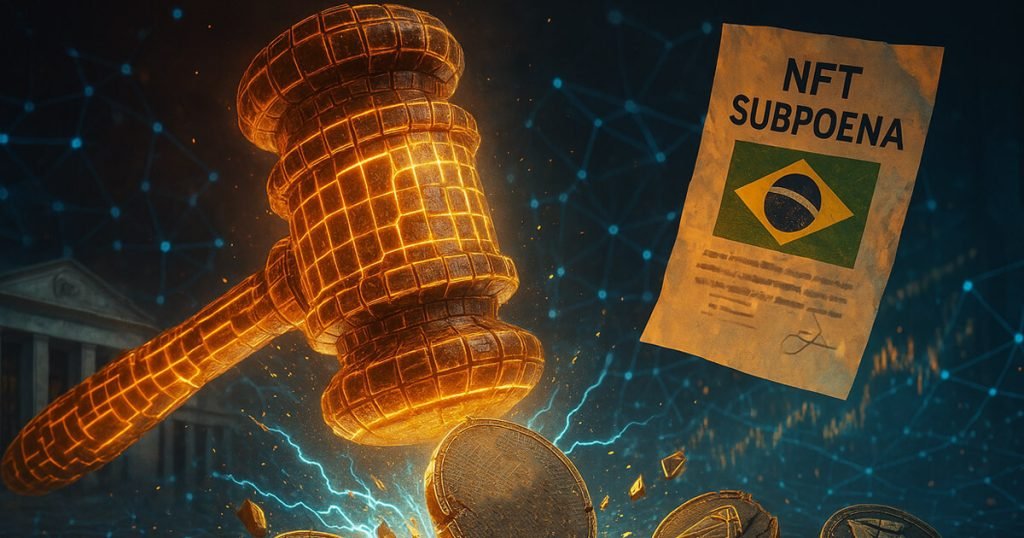Brazilian Court Authorizes NFTs for Legal Notifications in Bitcoin Case
A groundbreaking decision in Brazil has allowed for the use of non-fungible tokens (NFTs) as a means of notifying unidentified defendants in a high-profile case involving missing Bitcoins (BTC) due to an alleged pyramid scheme attributed to BWA Brazil. This legal ruling emerged from proceedings initiated by the court-appointed trustee of BWA Brazil’s bankrupt estate. The trustee aimed to halt the statute of limitations concerning claims tied to the crypto assets reportedly acquired using funds from creditors.
Innovative Legal Processes
The court ruling effectively permits digital service of legal documents by minting NFTs that include pertinent information and dispatching them to wallet addresses involved in the questionable transactions. The court noted, “Creditors who suffered multimillion-dollar losses cannot be further harmed by legislative delays in keeping up with technological innovation.” This decision underscores a commitment to leveraging emerging technologies within the legal framework, recognizing the need to adapt to advancements in the digital landscape. The Public Prosecutor’s Office also supported this innovative approach, reinforcing the urgency of protecting the rights of affected creditors.
Tracing Defendants Through Blockchain
The legal action specifically targets holders of digital assets whose identities are unknown but whose wallet addresses can be traced through the Bitcoin blockchain. According to the trustee’s claims, BWA Brazil acquired approximately 11,200 BTC through questionable means, utilizing creditor funds. At today’s market rates, these Bitcoins hold a staggering value of over $900 million. These allegations are particularly critical as the implicated transactions took place prior to the firm’s bankruptcy, making them subject to potential recovery efforts.
Background on BWA Brazil and Its Collapse
BWA Brazil, established in 2017 by Paulo Roberto Ramos Bilibio, was marketed as an investment vehicle providing Bitcoin exposure and offering unrealistic returns of 5% monthly on deposits. This model was unfeasible for a variable-return asset like Bitcoin. The company halted withdrawals in early 2020, leaving customers facing losses estimated at R$300 million (around $52.2 million). The fallout from this scheme has been regarded as one of Brazil’s largest crypto-related financial debacles. Although a Brazilian court initially approved BWA for judicial recovery in mid-2020, the process shifted to bankruptcy within a year due to the lack of credible efforts to reimburse clients.
The Challenge of Anonymity in Cryptocurrency
The court-appointed trustee pointed out that while wallet addresses maintain anonymity, Bitcoin’s architecture allows for the tracing of coins through transactions recorded on the blockchain. Once BTC is entered into a wallet, it can be transacted multiple times; however, each transaction remains permanently recorded. The filing mentions that some Bitcoin was transferred through centralized exchanges, which may ease recovery efforts as these platforms are required to report transactions to authorities. Conversely, peer-to-peer transfers present challenges for attribution since these transactions often occur without intermediaries, necessitating the innovative method of blockchain-based notifications.
Legal Innovation in the Age of Decentralization
The judicial use of NFTs to notify defendants sets a noteworthy precedent for how legal systems might evolve to integrate with blockchain technologies. As courts globally grapple with the complexities of decentralized assets, the ability to adapt procedural norms is essential. Using digital tokens for legal notifications reflects an understanding of the peculiarities of blockchain financial activity, targeting the intricate legal challenges presented by this new financial era. This case demonstrates a proactive approach to harmonizing emerging technologies with established legal practices, ultimately promoting justice and accountability for those impacted by digital asset schemes.
Conclusion
The Brazilian court’s approval to utilize NFTs for legal notifications in the BWA Brazil case could signal a significant shift in the intersection of law and technology. As cryptocurrency and blockchain continue to evolve, it is crucial for legal frameworks to adapt accordingly, ensuring that justice is served effectively and efficiently in the digital age. This case not only highlights the vulnerabilities within the crypto market but also points towards a future where legal systems increasingly acknowledge and integrate technological advancements.


